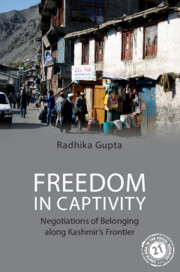Book contents
- Frontmatter
- Contents
- List of Figures
- Acknowledgements
- List of Abbreviations
- Notes on Transliteration
- Introduction: Freedom in Captivity
- 1 Genealogies of Political Consciousness
- 2 Reforming Self and Society
- 3 Fighting for Justice
- 4 Talking about Culture
- 5 Living on the Edge
- Epilogue
- Glossary
- Bibliography
- Index
Epilogue
Published online by Cambridge University Press: 10 January 2023
- Frontmatter
- Contents
- List of Figures
- Acknowledgements
- List of Abbreviations
- Notes on Transliteration
- Introduction: Freedom in Captivity
- 1 Genealogies of Political Consciousness
- 2 Reforming Self and Society
- 3 Fighting for Justice
- 4 Talking about Culture
- 5 Living on the Edge
- Epilogue
- Glossary
- Bibliography
- Index
Summary
By 2019, Vijay Diwas had become a simulacrum. To celebrate its twentieth anniversary, one of the biggest shopping malls in upmarket South Delhi created an installation that simulated the Kargil War. Visitors, the mall advertised, could soak in the ‘Kargil spirit’ by visiting a scene, including a big bunker, reportedly conjured from letters sent by war heroes to their families from the battlefront. The installation abstracted the War from Kargil as a place with people and a prior history. It fed into maintaining the strategic importance of Kargil in relation to the ‘hyper visible psychic border’ that Kashmir represents in the national imagination. Such war memorialisations are also a tactic of distracting a jingoistic majoritarian Indian public from the insecurity that has always haunted the post/ colonial state along Kashmir’s frontiers. This insecurity could not have been more evident – for those who chose to use their ‘aql – in the manner by which India illegally revoked Articles 370 and 35A of the Indian Constitution in August 2019. This was accompanied by the bifurcation of the state of J&K into the two UTs of J&K and Ladakh (encompassing Leh and Kargil). Along with the Kashmir Valley, Ladakh too was placed under a telecommunications siege, unpredictably oscillated yet again into disconnection from the world. As additional military troops entered the Valley, Hindu pilgrims and Indian tourists were evacuated in the preceding days. Just as Ladakh’s destiny had been arbitrarily conjoined with that of Kashmir through Hindu Dogra colonisation, it was overnight decoupled from it with neither warning nor discussion.
The sense of uncertainty that had constituted the ambient atmosphere of the Kargil borderland through the multiple partitions was reactivated. Social activist Sajjad Kargili, speaking of the psychological impact of this rupture, said:
We have already seen so many divisions in the past seventy years. We have been divided from Baltistan in 1947. Then after that we saw so many divisions in the 1965 and 1971 wars with Pakistan…. We feel the pain of separation and are connected and dependent on the Kashmir Valley.
In administratively and politically severing Ladakh from Kashmir, Indian tentacles of captivity dug deeper and sharper into the region.
- Type
- Chapter
- Information
- Freedom in CaptivityNegotiations of Belonging along Kashmir's Frontier, pp. 194 - 200Publisher: Cambridge University PressPrint publication year: 2023



